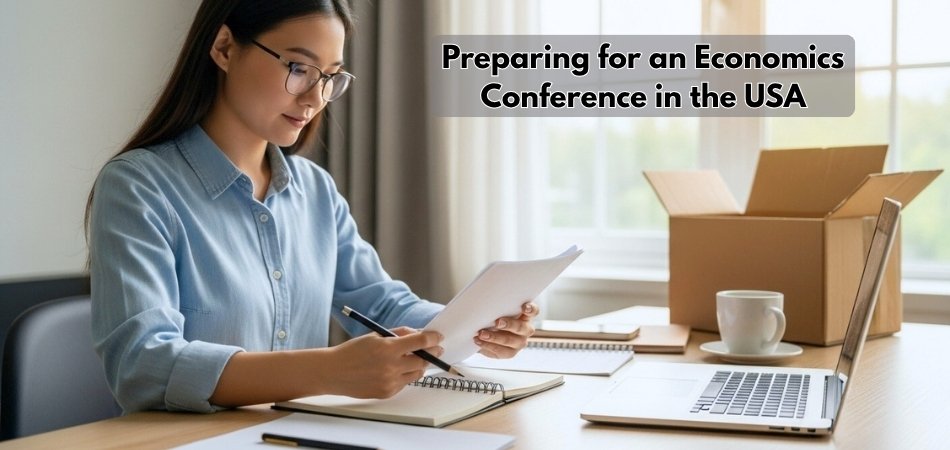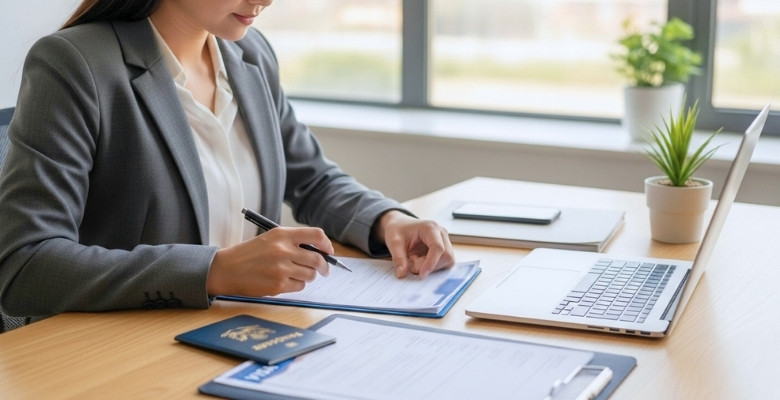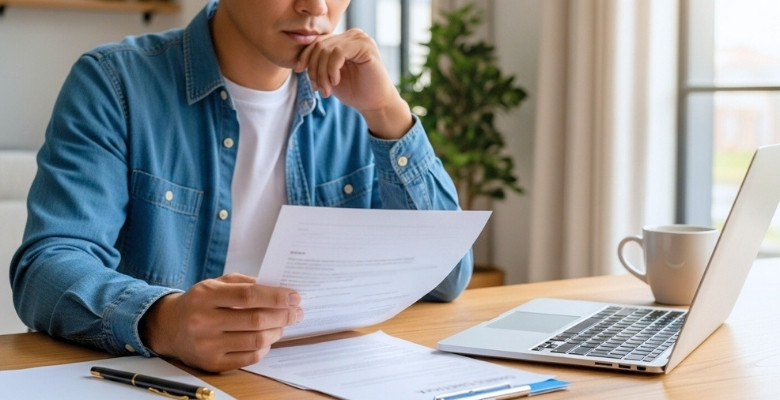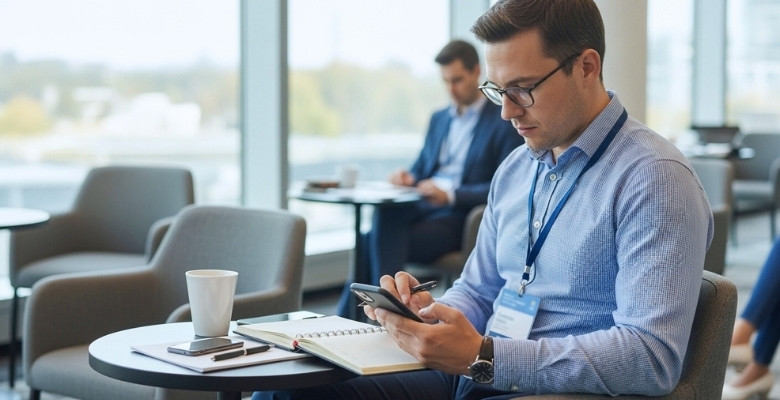Economics conferences are filled with fresh perspectives, thought-provoking sessions, and professionals from across the globe. They offer a chance to explore current trends, exchange ideas, and see where the world of economics is heading. If you’re planning to attend one, you might be asking yourself: how do I prepare for an economics conference in the USA?
Prepare for an economics conference in the USA by selecting the event that matches your interests, registering early, arranging your travel and stay, and reviewing the program in advance. Set your goals, refine your presentation if you have one, and get ready to meet and learn from others in the field.
Want to make sure you’re fully prepared and nothing gets overlooked? Keep reading—this guide walks you through every step, from choosing the right event to what to bring with you. Everything is explained in a clear, simple way to help you feel confident and ready.
How Do I Prepare for an Economics Conference in the USA?
Attending an economics conference in the USA can be an amazing experience. It’s a chance to explore fresh ideas, engage with experts, and share your own perspectives. With a bit of thoughtful preparation, you can get the most out of your time and enjoy every part of the event. Here are some details about how to prepare for an economics conference in the USA:
Getting Ready Before the Conference
Much of your success at a conference depends on how well you prepare ahead of time. Whether you’re choosing which event to attend or getting your travel in order, planning early can help reduce stress and improve your experience. Here’s how to get started:
Find the Right Conference for You
Begin by selecting a conference that aligns with your interests. Some focus heavily on academic research, while others center around policy-making or practical applications. Many conferences in USA cover a wide range of topics within economics, so take time to read about the themes, typical attendees, and types of sessions offered. Not sure where to begin? Look up a few upcoming events to spark ideas.
Sign Up and Make Arrangements
Register as soon as possible to avoid missing out. If you’re traveling internationally, be sure to start the visa process early. Get all your documents in order—your passport, any invitation letters, and visa paperwork. It’s also a good idea to book flights and accommodation early for the best prices and proximity to the venue.
Review the Schedule in Advance
Look through the event agenda and highlight the sessions you’re most interested in. Check out the speakers in those sessions and learn about their work so you’re ready to ask insightful questions or start meaningful conversations. Reading a few of their published papers beforehand can make a big difference.
Set Clear Goals
Think about what you want to accomplish at the conference. Are you there to deepen your understanding of a certain topic, build professional relationships, or present your own work? Having clear intentions helps you use your time wisely and stay focused throughout the event.
Prepare Your Presentation
If you’ll be speaking, take time to understand your audience. Design visuals that are clear and engaging. Practice delivering your talk aloud, and keep an eye on the time. Instead of memorizing every word, aim to know your content well enough to speak naturally. Don’t forget to bring a backup of your slides on a USB drive or cloud storage.
Get Ready to Network
Bring along business cards with your name, email, and a link to your work if you have one. QR codes or LinkedIn are also common ways to share contact information, so have those handy. Being prepared to connect makes it easy to follow up with the people you meet.
During the Conference
Once you arrive, it’s time to soak in the experience. From listening to fascinating talks to meeting fellow attendees, there’s a lot to gain. Here is some advice for staying on track during the event:
Dress Well and Stay Comfortable
Business casual is usually the norm—shirts, blouses, slacks, and skirts all work. Comfortable shoes are a must, since you’ll be walking and standing quite a bit. Even if it’s warm outside, bring a light sweater or jacket, as conference centers can be chilly.
Be Friendly and Start Conversations
Wear your name badge clearly, and don’t hesitate to introduce yourself to others. Ask about what sessions they’ve enjoyed or what projects they’re working on. Poster presentations and informal gatherings are great places to meet people. If you find someone you’d like to stay in touch with, exchange contact info right away.
Attend and Participate
Show up to the sessions you’ve marked and jot down key ideas or resources. If you come across something confusing or intriguing, ask a question—just be sure to introduce yourself briefly first. Having water and a snack with you can also help you stay focused throughout the day.
Stay Flexible and Curious
Stick to your plan, but leave room for the unexpected. Sometimes an unplanned session or spontaneous conversation can be the highlight of your trip. If someone invites you to join them for coffee or a discussion, take the opportunity—you never know where it might lead.
Documents You Should Carry to a U.S. Economics Conference
Having the right documents during travel for an economics conference in the USA is essential for a smooth and stress-free experience. From identification and travel records to materials related to the event, keeping everything organized will save you time and trouble. Here’s a handy list of key documents to carry with you:
| Document Name | Purpose | Tips |
| Passport | Required for international travel and identification | Ensure it’s valid for at least 6 months beyond your stay. |
| U.S. Visa | Necessary for non-U.S. citizens to enter the country | Keep both digital and printed copies of your visa and approval notice. |
| Conference Registration Proof | Verifies your participation at the event | Print the confirmation email or carry the QR code from your registration. |
| Invitation Letter | Often needed for visa interviews or conference entry | Provided by the conference organizer—request it early. |
| Travel Itinerary | Details your flights and other transport plans | Include flight tickets, airport shuttles, and layover details. |
| Hotel Booking Confirmation | Proof of accommodation while attending the event | Have the hotel name, address, and booking reference handy. |
| Presentation Materials | For those speaking or presenting at the event | Carry your slides on USB, cloud storage, and email backups. |
| Academic/Work ID | Identifies your affiliation with a university or institution | Useful for networking and registration check-ins. |
| Health Insurance Document | Covers any medical needs during your trip | Ensure it’s valid in the U.S. or includes international coverage. |
| Emergency Contact Info | Important in case of travel or health issues | Keep a written copy along with digital versions in your phone. |
How Far in Advance Should You Start Preparing for an Economics Conference in the USA?
Planning early makes everything easier and less stressful. You should begin preparing at least two to three months before the conference starts. This gives you time to choose the best event that matches your goals and interests. It also helps with things like getting a visa, booking travel, and finding a good place to stay.
If you’re coming from outside the United States, start even earlier—about four months ahead is better. Applying for a visa can take time, and flights get expensive if you wait too long. Having extra time means you can focus more on learning and less on rushing. Early planning also lets you read about the speakers, topics, and people attending the event.
Once you’ve registered and made your travel plans, use the last few weeks to get ready in smaller ways. Read the conference schedule carefully and highlight sessions you don’t want to miss. If you’re presenting, spend time improving your slides and practicing your talk out loud. Pack everything you’ll need, like clothes, ID, and printed papers, so you’re fully prepared to enjoy the event.
Is It Expensive to Attend an Economics Conference in the USA?
Costs can vary a lot depending on the city, the event, and your personal choices. Some conferences have high registration fees, especially big ones. You’ll also need to think about flights, hotels, meals, and transportation in the area. For students and early researchers, these costs can really add up quickly.
However, attending doesn’t always have to break your budget if you plan things wisely. Booking flights early and staying in budget hotels or hostels can save a lot. Many people even share rooms with others to split the cost. Also, you may be able to get funding to attend an economics conference in the USA through your school or organization.
Smaller events or university-hosted conferences are usually much cheaper than large international ones. Some even offer discounted fees or free registration for students. It’s a good idea to check the conference website or email the organizers to ask about support. With good planning, attending a conference can be both affordable and worthwhile.
What Kind of Visa Do You Need to Attend an Economics Conference in the USA?
If you’re planning to go to an economics conference in the USA, it’s important to know which visa you might need. A visa is like special permission to visit the country. Without the right one, you can’t enter. So let’s break it down in a simple way and help you understand what to do next.
Tourist Visa (B-2)
Most people going to a conference for fun or learning use the B-2 visa. This visa is made for people who want to visit the USA for short trips like tourism or attending events. You can use it if you’re not getting paid for anything at the conference. You’ll need to show that you’ll return to your country after the trip. Also, you might have to show proof of hotel booking and return ticket.
Business Visa (B-1)
The B-1 visa is good if you’re attending the conference for professional reasons. People use this visa when they want to join meetings, do research, or give a talk. It works well if the event is connected to your job or work area. You can’t do a job in the USA with this visa, but you can join events or meet others. This visa usually needs an invitation letter from the conference organizers.
How to Apply
To apply, first fill out a form called DS-160 online. After that, you pay a fee and book an appointment at the U.S. embassy. During the interview, you answer simple questions about your trip. You’ll need to bring papers like your passport, appointment letter, and a photo. Once approved, your passport will be sent back with the visa in it.
What You Should Bring
You need a valid passport that won’t expire soon. Bring your conference invitation letter, hotel booking, and return flight details. It helps to carry proof that you’ll return home, like school or job documents. Don’t forget to keep your visa fee receipt. Having all papers ready will make things easier.
Visa Tips
Apply early so you don’t get stressed at the last minute. Keep copies of all your documents in case you lose something. If you’re unsure about the form, ask someone who has done it before. Always be honest in the interview. It’s okay to feel nervous—they just want to know why you’re going.
Steps to Take If Your U.S. Visa Is Denied
It can feel really upsetting when your visa is not approved, especially if you were excited to travel for something important. But don’t worry—this happens to many people and there are ways to try again. You just need to understand why it was denied and what to do next. Here are some steps that can help you move forward:
Stay Calm First
When you hear your visa was denied, it’s okay to feel sad or confused. But the first thing to do is stay calm. Getting upset won’t change anything, and there are still things you can do. Try to clear your mind and think about what might have gone wrong. Many people fix their problems and get approved later.
Read the Reason
Your visa may be denied for specific reasons, which are usually explained in a paper or message. Read it carefully and try to understand what was missing or incorrect. It could be due to missing documents, unclear answers, or vague travel plans. If anything seems confusing, take time to research or ask for help. Understanding the reason is key to improving your next application.
Don’t Reapply Right Away
It may feel like you want to apply again the next day, but wait a little. Rushing without fixing the problem can lead to another denial. Take time to understand what went wrong and gather everything you need. When you’re better prepared, your chances are higher. It’s better to wait and get it right than to keep getting denied.
Check Your Documents
Go back and look at all the documents you gave them. Were they complete and correct? Maybe something was missing, like your bank paper, travel plans, or return proof. Make a list of what you gave before and what you missed. Next time, double-check before you apply again.
Fix the Problem
Once you know what went wrong, try to fix that part before applying again. If they said you don’t have enough ties to your country, add proof that shows you will return. If something was unclear in your answers, practice explaining it better next time. Show them you are honest and your reason to travel is strong. That can really help.
Reapply When Ready
When you feel more prepared and confident, you can apply again. Make sure everything is clear, complete, and honest this time. Go to the interview with calmness and clear answers. If you fixed what was missing, they might approve it this time. Always keep a copy of what you submit.
How Can You Make the Most of Networking Opportunities at an Economics Conference?
You’ll meet many people who share similar interests or know something new at economics conferences. Talking to others can be helpful and sometimes even lead to great future opportunities. It may feel tricky at first, but it gets easier with small steps. If you want to connect well and make the most of it, keep reading the tips below.
Start Small Conversations
A friendly “hello” can open up a nice talk with someone new. Try speaking to the person sitting next to you before a session begins. Ask what talk they’re looking forward to or where they’re from. Small questions like these make it easier to start a longer conversation. The goal is not to impress anyone but to connect in a simple, honest way.
Ask About Their Work
Instead of talking only about yourself, show interest in what others are doing. Ask what their topic is or what they liked about a session. People enjoy sharing their thoughts when they feel someone is really listening. This makes them more likely to remember you. Being curious is one of the best ways to make a real connection.
Join Group Discussions
When you see a group talking, it’s okay to gently join in. Listen first, then add something if you have an idea or question. You don’t need to say anything big—just a short thought is enough to be part of the talk. Many people feel shy at first, but groups can be a great way to meet more than one person at once. Over time, joining becomes easier.
Share Simple Details
If someone asks about you, start by sharing your name and where you’re from. You can also mention a few topics you enjoy learning about. Keep it light and friendly—not too long or formal. This makes it easier for others to connect with you. If you have a card or contact info, feel free to share it.
Attend Informal Sessions
Some parts of the conference feel more relaxed than others. Aside from going to talks, spending time at poster sessions at economics conferences gives you a good chance to meet speakers and other people in a casual way. These spots are usually quieter, so you don’t have to rush while talking. People are also more open and friendly in these moments. It’s a nice time to chat with others who like the same topics as you.
Take Breaks Together
Sometimes, the best conversations happen during lunch or snack breaks. If someone is sitting alone, ask if you can join them. Or if you’re already in a group, invite others along. Eating together makes talking feel more natural and less formal. These small moments can build strong connections.
Follow Up After
After the event, it’s nice to send a quick message or email to someone you enjoyed talking with. Just say it was great meeting them and maybe mention something you talked about. Keeping in touch doesn’t mean sending long messages—just something simple is enough. If you see them again at another event, they’ll remember you. Staying connected keeps the conversation going.
Tips on Managing Your Time at the Economics Conference
An economics conference can get busy quickly with so many talks, people, and things to do in one place. If you don’t manage your time well, you might miss out on something important or feel too tired. Planning smartly helps you enjoy more without stress. Keep reading for simple tips that can help you use your time better at the event.
Make a Simple Plan
Start by checking the conference schedule a day before it begins. Choose the sessions you want to attend and write them down. Pick one or two breaks during the day to rest. Try not to fill every hour, so you don’t feel rushed. A light plan makes your day smoother.
Prioritize Important Sessions
Look for talks or panels that really match your interest. Some sessions may be more useful than others for what you want to learn. Pick those first, and then add others if you have time. This way, you won’t miss what matters most to you. It also keeps your focus clear.
Keep Track of Time
Use a watch, phone alarm, or reminder to stay on track during the day. It’s easy to lose track when you’re deep into a talk or chat. A gentle beep can help you move to the next session on time. Being aware of time lets you do more with less stress. It also helps you not miss anything fun.
Avoid Back-to-Back Sessions
Going to one session after another without a break can make you tired fast. Give yourself a little time to walk around or have water. Skipping short breaks can make you feel sleepy and lose focus. Even five minutes can help you feel better. Rest helps your brain stay sharp.
Carry a Small Notebook
Writing things down helps you remember what you liked. It also helps when you want to follow up with someone later. You don’t need to write a lot—just quick notes or ideas. It’s better than trying to remember everything. A notebook also helps you use time between sessions wisely.
Say “No” Sometimes
You don’t have to attend everything just because it’s on the schedule. If you’re tired or not interested, it’s okay to skip. Use that time to relax or have a snack. Doing less can help you enjoy more. You’ll feel better and focus more when it counts.
Use Breaks Smartly
Breaks aren’t just for food—they’re also good times to talk to others. A short chat during lunch can lead to new ideas or friends. You can also review your notes or plan your next session. Try not to spend every break on your phone. Use them to refresh or connect.
Be Flexible
Plans don’t always go the way you want, and that’s okay. Sometimes a talk gets delayed, or a better one pops up. Don’t feel bad about changing your plan if needed. Being flexible lets you enjoy surprises too. Go with the flow when it feels right.
Commonly Asked Questions
If you’re still curious about a few more things before heading to an economics conference in the USA, you’re not alone. Many people have questions that come up while planning or attending. Below are some common ones that can help you feel more ready.
Can I Take Photos or Videos at an Economics Conference in the USA?
Taking photos or videos at an economics conference in the USA depends on the event rules. Some allow photos but not recordings. Always ask if you’re unsure. It’s polite and keeps things running smoothly.
What Should I Do If I Arrive Late to an Economics Conference in the USA?
If you arrive late at an economics conference in the USA, don’t stress—just check the event schedule right away. Join the next available session or talk. Ask the help desk for any updates you missed. You can still catch up with people during networking breaks.
Can I Attend Just One Day of an Economics Conference in the USA?
Yes, attending just one day of an economics conference in the USA is usually allowed if you get a single-day pass. Choose the day with the most interesting sessions. Check the official website for details before you register. This helps you get the most from your short visit.
How Can I Find Other Attendees Before the Conference?
Many conferences have email groups, apps, or social media pages where attendees chat before the event. Joining these helps you meet people early and plan connections. Look for official links after you register. Early contact makes networking feel easier when you arrive.
Do I Need to Know Everything About Economics to Attend?
No, you don’t need to know everything. Conferences are made for learning, whether you’re new or experienced. Just be open to new ideas and ask questions when you’re curious. Everyone starts somewhere, and people are usually friendly and helpful.
Is It Okay to Leave a Session Early?
Yes, if a session isn’t what you expected, it’s okay to leave quietly. Just make sure not to disturb others. Choose something more useful for your goals. Being respectful and mindful makes it easier to explore other sessions freely.
How Can I Make Notes That Are Easy to Review After an Economics Conference in the USA?
Keep notes simple at an economics conference in the USA. Write clear points, speaker names, and interesting ideas. Use headings for each topic. This way, you can easily go back and understand everything later.
Is It Worth Visiting Booths at an Economics Conference in the USA?
Yes, visiting booths at an economics conference in the USA can be very useful. You might find helpful resources, meet professionals, or learn about new tools. They often give away fun items, too. It’s an easy way to learn outside the sessions.
Final Thoughts
Participating in an economics conference in the USA can be a fun and rewarding experience when you plan it right. From choosing the right sessions to packing smart and meeting new people, each step helps make the event smoother and more exciting. It’s not just about sitting in talks—it’s also about learning, sharing, and enjoying the whole event.
If you’ve been asking yourself how do I prepare for an economics conference in the USA, the answer is simple: plan early, stay organized, and keep an open mind. Whether you’re presenting or just attending, your preparation will help you enjoy more and stress less. Even small things like carrying water or knowing your schedule can make a big difference.
So take a deep breath, follow the tips, and go enjoy your conference experience. The more prepared you are, the more confident you’ll feel!









